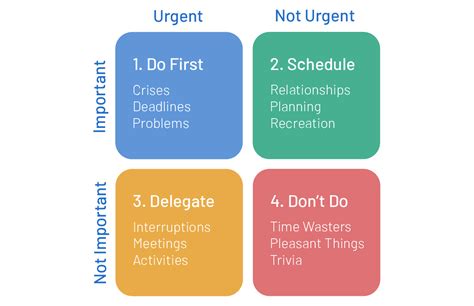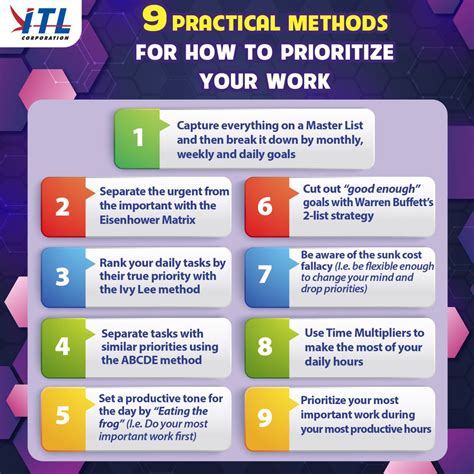In today's fast-paced world, where multitasking has become the norm, it is essential to find effective ways to manage your time in order to boost productivity and achieve success. By utilizing a combination of strategic planning, prioritization, and self-discipline, you can unlock the hidden potential of your daily routine and maximize your efficiency.
One vital aspect of enhancing productivity lies in mastering the art of task optimization. Instead of merely completing tasks for the sake of ticking them off your to-do list, it is imperative to focus on accomplishing tasks that truly align with your goals and deliver the most significant impact. Prioritizing tasks that are essential, challenging, or have long-term benefits can lead to a heightened sense of accomplishment and overall success.
Another key factor in effective time management is recognizing and curbing time-consuming distractions. Situations, habits, or individuals that divert your attention from crucial tasks can disrupt your flow and compromise productivity. By identifying these distractions and finding ways to eliminate or minimize their impact, you can regain control over your time and channel your energy into tasks that truly matter.
Creating a well-structured schedule to manage your time is paramount. Breaking down your day into manageable chunks can help you allocate the appropriate resources and attention to each task, ensuring a balanced and productive workflow. Whether it's through time-blocking, setting strict deadlines, or utilizing productivity apps, adopting a system that works best for your individual needs can revolutionize the way you approach and manage your tasks.
Ultimately, effective time management is an ongoing process of self-reflection, adjustment, and growth. By continuously reassessing your priorities and refining your techniques, you can establish a solid foundation for maintaining consistent productivity throughout your personal and professional endeavors. So, take charge of your time, embrace these proven strategies, and unlock your full potential to achieve remarkable results.
Prioritize Tasks for Optimal Efficiency

When it comes to managing your time effectively, one crucial aspect is the ability to prioritize tasks. Prioritization allows you to allocate your time and energy efficiently, ensuring that the most important and impactful tasks are completed first. By employing various strategies and techniques, you can maximize your productivity and make significant progress towards your goals.
Identify and categorize: Start by identifying all the tasks at hand and categorizing them based on their urgency and importance. Determine which tasks are time-sensitive and require immediate attention, and which tasks are less critical and can be addressed at a later time. This helps you establish a clear hierarchy of tasks and focus on what truly matters.
Set SMART goals: When prioritizing tasks, it is essential to set SMART goals. SMART stands for Specific, Measurable, Achievable, Relevant, and Time-bound. By setting SMART goals, you can clarify your objectives and evaluate the significance of each task. This enables you to prioritize tasks that align with your overarching goals and have a tangible impact on your productivity.
Consider effort and impact: Assessing the effort required for each task and its potential impact can aid in effective prioritization. Some tasks may be time-consuming and drain your energy, while others may have a significant impact on your progress. By weighing the effort and impact of each task, you can prioritize those that require less time but yield substantial results.
Utilize the Eisenhower Matrix: The Eisenhower Matrix is a popular time management tool that divides tasks into four quadrants: Urgent and Important, Important but Not Urgent, Urgent but Not Important, and Not Urgent and Not Important. By mapping out tasks according to this matrix, you can identify tasks that require immediate attention, tasks that can be postponed, tasks that can be delegated, and tasks that can be eliminated altogether.
Manage distractions: Managing distractions is crucial for effective task prioritization. Identify common distractions that hinder your productivity, such as excessive social media use or unnecessary meetings, and take steps to minimize or eliminate them. Creating a conducive work environment and utilizing techniques like time blocking can help you stay focused on your prioritized tasks.
Reassess and adjust: Prioritization is an ongoing process that requires regular reassessment and adjustment. Continuously evaluate your task list and reprioritize as needed. Circumstances may change, and new tasks may arise, so staying flexible and adaptable in your prioritization approach is key.
By mastering the skill of task prioritization, you can enhance your efficiency and productivity, ensuring that your precious time and efforts are dedicated to tasks that truly matter. Implement these techniques and strategies to make the most of your time and achieve your desired outcomes.
Setting Clear and Achievable Objectives
Establishing clear and attainable goals is a fundamental aspect of optimizing your productivity and effectively managing your time. By defining objectives that are specific, measurable, achievable, relevant, and time-bound (SMART), you can create a framework for success. Clear goals provide focus and direction, enabling you to prioritize effectively and allocate your time and resources efficiently.
Specific: Clearly define the desired outcome or result of your goal. Avoid vague or ambiguous objectives, as they can lead to confusion and hinder progress. |
Measurable: Establish measurable criteria to track your progress and evaluate the success of your goal. Utilize quantitative or qualitative measures to determine if you are on track and make adjustments as necessary. |
Achievable: Ensure that your goals are realistic and attainable within the given resources, time constraints, and capabilities. Set objectives that challenge you, but are still within your reach to maintain motivation and prevent frustration. |
Relevant: Align your goals with your overall objectives, values, and priorities. Identify the significance of each goal in relation to your long-term vision and ensure they contribute to your personal or professional growth. |
Time-bound: Assign a specific timeframe to each goal to create a sense of urgency and prevent procrastination. Setting deadlines can help you stay focused, prioritize your tasks, and efficiently manage your time. |
By setting clear and attainable goals using the SMART framework, you can boost your productivity and make the most of your time. These well-defined objectives provide a roadmap for success, guiding your actions, and ensuring that your efforts align with your ultimate aspirations. Remember to regularly review and adjust your goals as needed to stay on track towards accomplishing what truly matters to you.
Eliminate Time-wasting Activities and Distractions

In order to enhance efficiency and accomplish more in a given timeframe, it is crucial to identify and eliminate unproductive tasks and distractions that impede progress towards goals. By minimizing unnecessary activities and external disruptions, individuals can optimize their time utilization and successfully focus on essential tasks.
Identify and Prioritize
An effective strategy to eradicate time-wasting activities is to develop a thorough understanding of tasks and determine their significance. By categorizing tasks based on their importance and urgency, individuals can prioritize their efforts towards accomplishing high-value activities, yielding greater productivity in the long run.
Minimize Procrastination
Procrastination, the art of postponing tasks, poses a significant threat to effective time management. By employing proper planning, breaking down tasks into smaller, manageable components, setting realistic deadlines, and utilizing self-discipline, individuals can minimize the temptation to procrastinate, allowing for more focused attention on completing tasks in a timely manner.
Reduce Multitasking
Despite the belief that multitasking enhances productivity, it often leads to inefficiency and decreased output. By focusing on a single task at a time, individuals can fully dedicate their attention and efforts, resulting in higher quality work and faster completion. Implementing techniques such as time blocking and prioritizing tasks sequentially can help maintain concentration and reduce the inclination to engage in unproductive multitasking.
Eliminate Distractions
The prevalence of distractions in today's digital age can severely hinder productivity. It is crucial to identify and eliminate or minimize sources of distraction, such as social media notifications, email alerts, or excessive noise. By creating a designated and distraction-free workspace, individuals can enhance their ability to concentrate, stay on track, and accomplish tasks more efficiently.
Create Boundaries
One effective way to avoid time-wasting activities is by establishing boundaries with colleagues, friends, and family. Clearly communicate your availability and the need for uninterrupted focus during certain periods to minimize interruptions and maintain productivity. Implementing strategies such as setting specific office hours or utilizing tools that block notifications during designated time blocks can help establish these boundaries effectively.
Delegate and Outsource
Recognizing that it is impossible to do everything alone is crucial for effective time management. By delegating tasks to capable colleagues or outsourcing non-core activities, individuals can free up time and mental energy to focus on high-value tasks that align with their strengths. Effective delegation not only boosts productivity but also enhances team collaboration and development.
Reflect and Evaluate
Regularly reflecting on one's habits and evaluating the effectiveness of time management techniques is vital for continuous improvement. It allows for the identification of areas for optimization and the implementation of necessary adjustments. Keep track of how time is being utilized, identify patterns, and modify strategies accordingly to further enhance productivity and achieve desired goals.
Implement Time-blocking Technique for Enhanced Organization
In today's fast-paced world, effectively managing your schedule is crucial for maintaining productivity and achieving desired outcomes. One powerful strategy to optimize your time is by implementing the time-blocking technique. This technique allows you to allocate specific blocks of time for different tasks and activities, providing structure and focus to your day.
By utilizing the time-blocking technique, you can enhance your organization skills and make the most out of each day. Rather than having a vague to-do list, this approach encourages you to prioritize tasks based on their importance and urgency. By assigning time slots to specific activities, you create a clear roadmap for your day, ensuring that essential tasks are completed while also allowing for flexibility and adaptability.
Benefits of time-blocking:
- Optimal focus: By dedicating specific time blocks to individual tasks, you can eliminate distractions and fully concentrate on the task at hand. This intensifies your focus, leading to enhanced productivity and quicker task completion.
- Mental clarity: The time-blocking technique helps in reducing decision fatigue by providing a structured schedule. With predefined time slots for different activities, you eliminate the need to constantly decide what to work on next, allowing you to make progress with ease.
- Efficient planning: By planning your day in advance and allocating specific time blocks for different tasks, you can better estimate the time required for each activity. This enables you to create realistic schedules, effectively manage deadlines, and avoid overcommitting yourself.
- Improved work-life balance: Time-blocking allows you to prioritize not only work-related tasks but also personal activities, self-care, and leisure time. By consciously allocating dedicated blocks for these aspects, you can maintain a healthy work-life balance and prevent burnout.
Implementing the time-blocking technique requires discipline and commitment. Start by identifying your most important tasks and blocking specific time periods for their completion. It is crucial to assign realistic timeframes and set realistic expectations. Regularly evaluate and adjust your time-blocking schedule as needed to optimize your productivity and achieve your goals.
Remember, the time-blocking technique is a valuable tool for better organization and enhanced productivity. Embrace this approach to unlock your full potential and take control of your schedule, leading to increased efficiency and overall satisfaction in both your personal and professional life.
Maximize Time Efficiency by Assigning Tasks to Optimize Productivity

In order to enhance your efficiency and make the most of your available time, it is crucial to delegate various responsibilities throughout your work or personal projects. By properly distributing tasks to appropriate team members or individuals, you can streamline your workflow and improve overall productivity.
How Delegate Tasks Benefits Time Optimization?
Delegating tasks allows you to relinquish certain responsibilities and distribute them among capable individuals, empowering them to contribute their expertise and skills. This not only lightens your workload but also ensures that each task is handled efficiently and effectively. By entrusting qualified individuals with delegated tasks, you can harness their unique talents and allow yourself to focus on higher-priority activities.
The Art of Effective Task Delegation
When delegating tasks, it is important to clearly communicate your expectations and provide necessary instructions or guidelines. Clearly define the objectives, deadlines, and any specific requirements associated with each task. Additionally, ensure that the person you are delegating to possesses the requisite knowledge and skills to successfully complete the assigned task.
Utilize the strengths and expertise of your team members by assigning tasks that align with their individual capabilities, allowing them to excel while contributing to the collective success of the project or organization.
Benefits of Task Delegation
Delegating tasks effectively has numerous advantages. Firstly, it allows you to allocate your time and energy to critical tasks that require your personal attention and expertise. Secondly, it enhances teamwork and collaboration by fostering a sense of shared responsibility and empowerment. Additionally, task delegation helps develop the skills and capabilities of team members, promoting individual growth and continuous learning.
By delegating tasks, you can optimize time usage and achieve higher levels of productivity, creating a more efficient and successful work environment.
Utilize Technology Tools for Enhanced Time Optimization
In today's fast-paced world, staying organized and maximizing efficiency is vital for achieving optimal results. As technology continues to advance, it offers an array of tools and resources that can greatly enhance time management and productivity. This section explores how harnessing the power of technology can revolutionize the way we manage our time and tasks, allowing us to accomplish more in less time.
Practice Effective Decision-making to Avoid Procrastination

When it comes to managing our time and increasing productivity, one crucial aspect is often overlooked - effective decision-making. Making good decisions allows us to prioritize tasks, eliminate distractions, and stay focused on our goals. By honing our decision-making skills, we can prevent the common trap of procrastination and ensure efficient use of our time.
Here are some strategies to practice effective decision-making:
- Set Clear Priorities: Clearly define your goals and prioritize them based on their importance and urgency. This will help you make informed choices about where to invest your time and energy.
- Consider the Consequences: Before making a decision, think about the potential outcomes and consequences. Will the task contribute to your long-term goals? Understanding the impact of your choices can help you make more thoughtful decisions.
- Break Down Tasks: Some tasks can feel overwhelming and lead to procrastination. Break down larger tasks into smaller, more manageable steps. This will make it easier to take action and avoid delay.
- Utilize Time Management Techniques: Employ time management techniques such as the Pomodoro Technique or the Eisenhower Matrix to make quick and informed decisions regarding task priorities and deadlines.
- Seek Input: When facing difficult decisions, seek input from others who may have valuable insights or expertise. Collaboration can lead to smarter choices and prevent unnecessary delays.
- Trust Your Instincts: Often, our instincts provide valuable guidance. Trust your intuition when making decisions, particularly when faced with time constraints or limited information.
- Eliminate Distractions: Minimize distractions that can sabotage your decision-making process. Turn off notifications, find a quiet workspace, and create a conducive environment that allows you to focus on the task at hand.
By practicing effective decision-making and implementing these strategies, you can avoid the pitfalls of procrastination and boost your productivity. Making conscious, informed choices will help you make the most out of your time and achieve your goals more efficiently.
Take Regular Breaks to Maintain Focus and Energy
Keeping a steady level of focus and energy throughout the day is essential for optimal productivity. One effective strategy to achieve this is by incorporating regular breaks into your daily routine. These breaks serve as short intervals of relaxation and rejuvenation, allowing your mind and body to recharge before diving back into tasks.
Benefits of Regular Breaks:
- Enhanced concentration: Breaks prevent mental fatigue and help sustain focus by giving your brain a chance to rest and recover. They prevent the onset of boredom and maintain an engaged mindset.
- Increased creativity: Taking breaks allows your mind to wander and explore new ideas. It encourages out-of-the-box thinking and promotes fresh perspectives, leading to innovative solutions.
- Improved physical well-being: Prolonged periods of sitting and sedentary work can have adverse effects on your health. Regular breaks provide an opportunity to stretch, move around, and promote better blood circulation.
- Reduced stress and mental fatigue: Breaks act as mini-vacations amidst your busy schedule. They offer a chance to unwind and relax, reducing stress levels and preventing burnout.
Effective Break Strategies:
1. Pomodoro Technique: Use a timer to work in focused bursts of around 25 minutes, followed by a short 5-minute break. Repeat this cycle three to four times and then take a more extended break, usually around 15-30 minutes.
2. Nature Breaks: Step outside and take a walk in nature during your breaks. Spending time surrounded by natural environments can improve cognitive function and restore mental energy.
3. Mindfulness Breaks: Practice mindfulness exercises during breaks, such as deep breathing or meditation. These activities help calm the mind, reduce stress, and improve overall focus and well-being.
4. Social Breaks: Engage in social interactions during breaks, whether it's having a quick chat with a colleague or calling a friend. Social connections can boost mood, increase motivation, and provide a pleasant diversion from work.
Remember, incorporating regular breaks into your schedule is not a form of procrastination but an essential part of effective time management. Embrace these breaks as opportunities to recharge and rejuvenate, enabling you to maintain high levels of productivity and focus throughout your workday.
Establish a Consistent Daily Schedule

Developing and adhering to a regular routine is a key ingredient in effectively managing your time and increasing your productivity. By establishing a consistent daily schedule, you create a framework that allows you to optimize your time and accomplish your tasks with efficiency.
A routine provides structure and stability, enabling you to focus on completing important tasks without becoming overwhelmed or wasting valuable time. Consistency in your schedule helps to train your mind and body to prioritize and allocate time effectively, leading to improved productivity and execution of tasks.
When developing your routine, consider your personal preferences and energy levels throughout the day. Identify your most productive times and allocate them for tasks that require concentration and focus. Additionally, decide on specific time slots for recurring activities, such as breaks, exercise, and self-care, to ensure a balanced and well-rounded routine.
To effectively stick to your routine, it's essential to eliminate distractions and create a conducive environment that supports your productivity. Minimize interruptions by turning off notifications on your devices, closing irrelevant tabs or applications, and communicating your need for uninterrupted working time to those around you. Creating a physical or virtual workspace that is free from clutter and distractions can further enhance your ability to stay focused and adhere to your routine.
Remember, developing a routine and sticking to it may require some adjustments and flexibility at the beginning. It's important to stay committed, evaluate your progress regularly, and make necessary tweaks to optimize your routine. By establishing a consistent daily schedule, you can effectively manage your time, increase productivity, and achieve your goals more efficiently.
FAQ
What are some effective time management techniques?
There are several effective time management techniques that can boost productivity. Some of them include creating a to-do list, prioritizing tasks, using time blocking, setting deadlines, minimizing distractions, and delegating tasks.
How can creating a to-do list help with time management?
A to-do list is a simple yet powerful tool for managing time effectively. By listing down tasks and prioritizing them, you have a clear overview of what needs to be done. It helps in staying organized, staying focused, and avoiding procrastination.
What is time blocking and how does it improve productivity?
Time blocking is a technique where you schedule specific blocks of time for different tasks or activities. It helps in increasing productivity as it allows you to allocate dedicated time slots for important tasks, reduces multitasking, improves focus, and ensures that all essential activities are given sufficient attention.
Why is minimizing distractions important for effective time management?
Minimizing distractions is crucial for effective time management as distractions often consume valuable time and hinder productivity. By minimizing distractions such as turning off notifications, closing unnecessary tabs, or working in a quiet environment, you can maintain focus, complete tasks faster, and utilize time more efficiently.
How can delegating tasks help in managing time effectively?
Delegating tasks involves assigning tasks to others who are capable of completing them. It helps in freeing up your time to focus on more important or complex tasks, reduces workload, improves efficiency, and promotes teamwork. Effective delegation can significantly contribute to better time management and increased productivity.
What are some effective time management techniques to boost productivity?
There are several effective time management techniques that can help boost productivity. One technique is creating a to-do list or a schedule to prioritize tasks and allocate time slots for each task. Another technique is practicing the Pomodoro Technique, which involves working in 25-minute intervals and taking short breaks in between. Additionally, using technology tools such as productivity apps or time-tracking apps can also help in managing time effectively.
How can I effectively manage my time to avoid procrastination?
To effectively manage your time and avoid procrastination, it is important to break down your tasks into smaller, more manageable chunks. Set clear deadlines for each of these smaller tasks and hold yourself accountable to meet these deadlines. Additionally, remove distractions from your work environment, such as turning off notifications on your phone or blocking certain websites. Creating a schedule or using a time management app can also help you stay organized and focused on your tasks.



